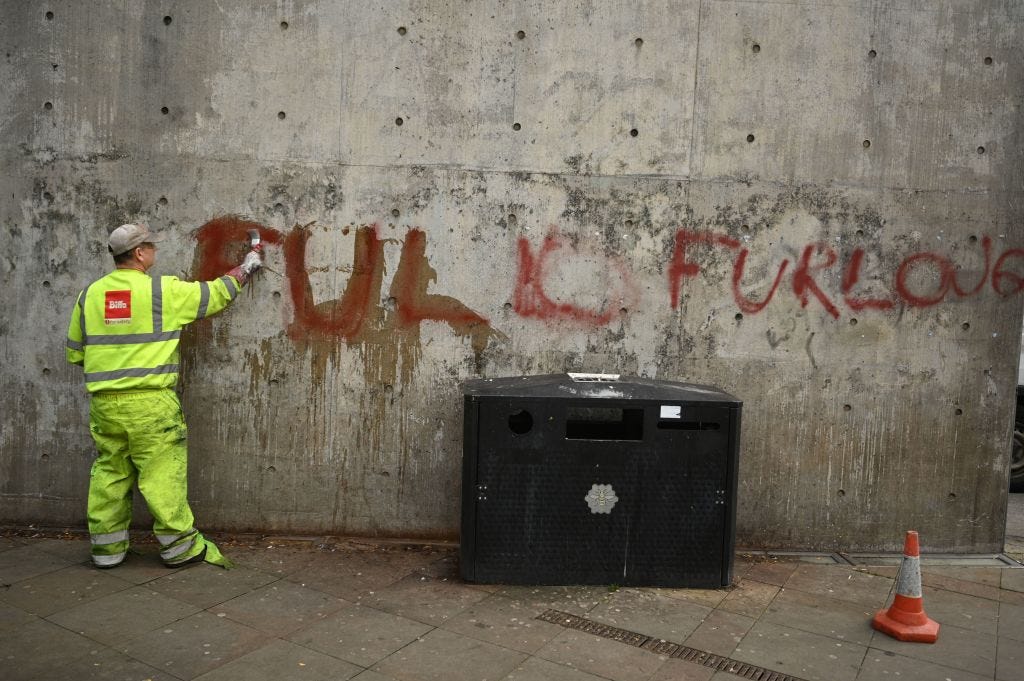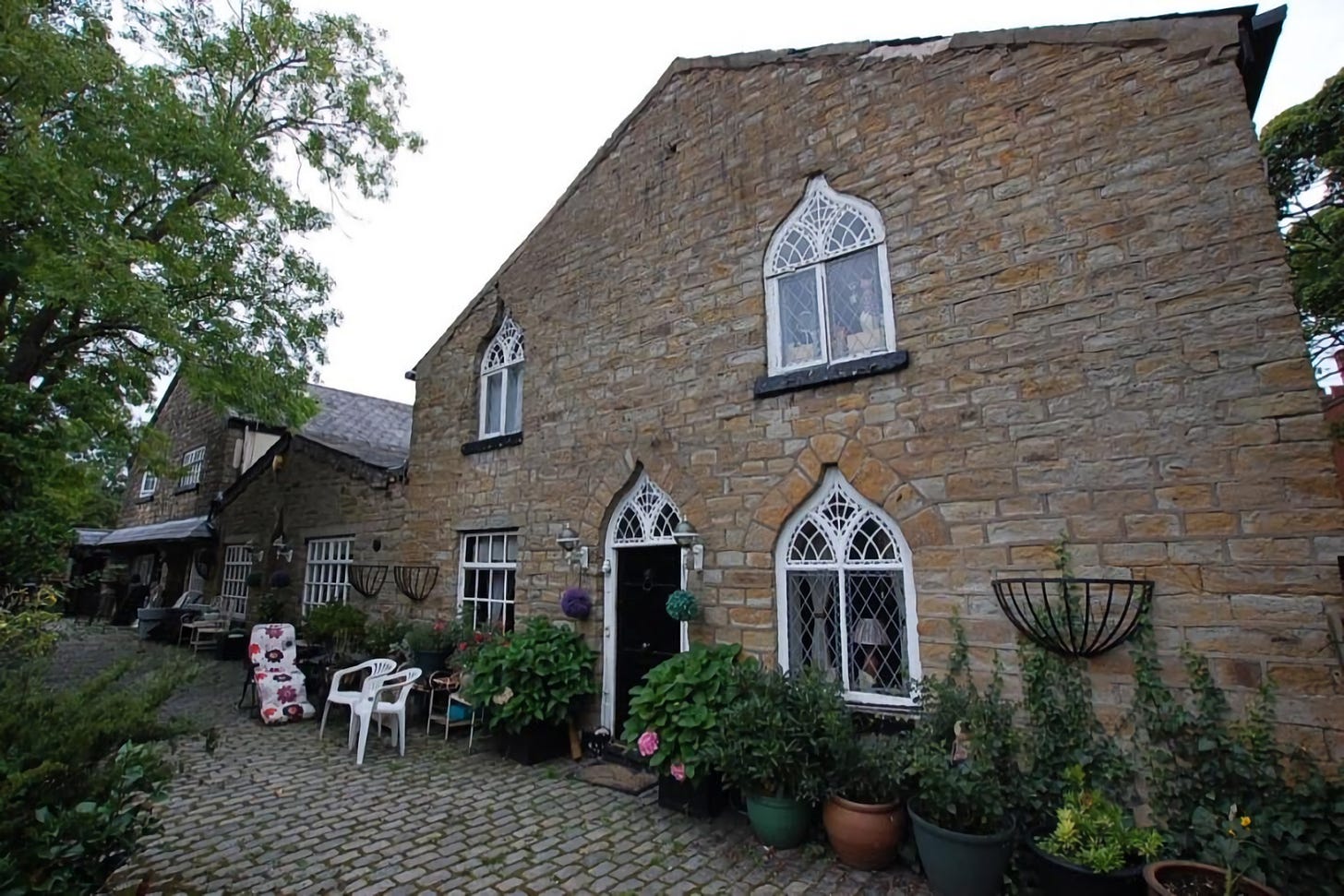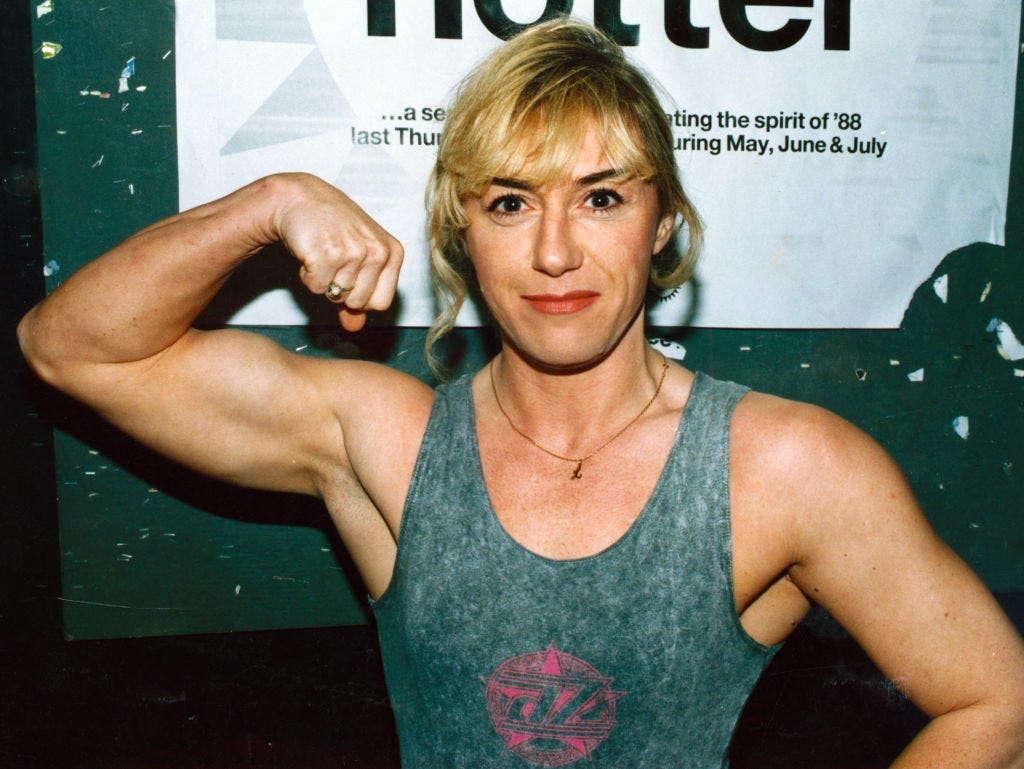'My mental health suffered significantly'
Greater Manchester sees the end of the furlough scheme this week, plus the rest of your weekly briefing
Dear Millers — welcome to this week’s briefing. We hope you’ve got your raincoats handy as our weatherman Martin is predicting plenty of rain this week. This week we take a look at the end of the furlough scheme in Greater Manchester, plus our usual recommendations.
On Saturday, we published a piece by Alex King who wrote about the divisive Places for Everyone plan, which will see swathes of Green Belt land in Greater Manchester released for development. If you’d like to share your thoughts or help inform our ongoing reporting about this, send an email over to editor@manchestermill.co.uk.
Last week we published a fantastic piece about French author Michel Butor’s ‘gorgeous literary hate letter’ to Manchester, a very popular article about Greater Manchester’s water supply, and another about our visit to The Monastery in Gorton. If you’re not a member yet, join up now to read those stories and get all our journalism in your inbox.
This week’s weather 🌦
Our forecast comes from local weatherman Martin Miles, who says “The jet stream will drive cool and often wet weather our way this week. Currently, model trends point towards a cool and unsettled start to October as well.”
Tuesday 🌦 A dry start, but rain will soon arrive from the west. The rain will be heavy at times, with occasional drier interludes. Windy and cool. Highs of 15°c.
Wednesday 🌦 A slight improvement on previous days, with sunny spells and occasional blustery showers. It will be windy and chilly though. Highs of 13°c.
Thursday 🌧 Wet with moderate to heavy rain, as a new low-pressure system arrives from the Atlantic. Highs of 14°c.
Friday 🌦 An autumnal start to October. The weather will be mixed, with sunny intervals, heavy showers and breezy conditions. Highs of 15°c.
Weekend 🍂 Further unsettled weather will follow. Temperatures will be a little below the seasonal average.
For the full forecast, please visit Manchester Weather.
🕵️♂️ Grist to The Mill: If you want to tell us about a story or pass on some information, please email joshi@manchestermill.co.uk, mollie@manchestermill.co.uk or dani@manchestermill.co.uk. We are always happy to speak to people off the record in the first instance, and we will treat your information with confidence and sensitivity. Get in touch.
The big story: Furlough ends in Greater Manchester
Top line: The government’s furlough scheme comes to an end this week, but with thousands of people in Greater Manchester still on it, there’s some uncertainty about what happens next.
The numbers: Since the beginning of the pandemic, almost half a million people in Greater Manchester were supported by the furlough scheme, which until this June, paid 80% of employees’ wages for hours not worked, up to £2,500.
The borough with the highest number of people on furlough was Manchester, totalling at 95,000. Bury had the lowest, with 32,000.
As of 31 July, around 70,000 people in GM are still accessing support — that’s 2.5% of Greater Manchester’s population.
Which sectors in the region are affected the most? Wholesale and retail jobs (including motor vehicle repair) have the highest number of people still being supported. This figure stands at 12,130. It’s closely followed by the accommodation and food services sector, with almost 11,000 people.
The Guardian heard from Peter, 39, an events administrator at the Royal Northern College of Music. This month he returned to work full-time, but was furloughed for 18 months and says he found it difficult.
…my mental health suffered significantly. I was under the constant stress of thinking my job could be discontinued at any moment. Being stuck indoors with lots of uncertainty got me down.

The local picture: Many people have already returned to work, but for those who haven’t, there’s a deadline. Earlier this month, the University of Manchester, which employs over 12,000 people, posted on StaffNet:
The majority of staff who have been on furlough leave have now returned to work. Any colleagues who are still on furlough leave will be asked to return to work on Friday, 1 October at the latest.
The end of the furlough scheme will coincide with the £20-a-week Universal Credit uplift, which is set to end just shy of a week later on 6th October. Marcus Rashford has urged the government to stop the cut.
What next? The scheme, first announced in March 2020, ends this Thursday. It’s predicted that almost 1 million jobs across the country could be at risk.
Tony Wilson, Director of the Institute for Employment Studies said that the end of furlough “won’t make a big difference to the path of unemployment or to the level of vacancies.”
Sir Richard Leese shared his concern about the impact on apprenticeships. He’s chair of the Local Government Association, which wants the government to continue providing financial help for employers with apprenticeship programs until March 2022.
It is clear that as the furlough scheme is phased out, there is the real possibility of a rise in the number of people out of work or training. To ensure people can get access to apprenticeships when they are needed the most, it is vitally important that the incentive scheme is extended.
Home of the week
This stunning Grade II farmhouse in Ashton-under-Lyne has beautiful windows, a cobbled courtyard and four stables. It’s on the market for £465,000.
Other local news in brief
Bolton Wanderers will no longer provide online betting facilities at its stadium, and will not sign any new sponsorship deals with gambling firms. Instead the club said it would "look at supporting charities and organisations that seek to provide help for those suffering from betting addiction.” Read more.
A 20-year-old man died at the weekend after falling ill at the Warehouse Project. Four people have been arrested on suspicion of drug offences. A spokesperson from The Warehouse Project said: "We are devastated and our condolences are with the individual's family and friends.” Read more.
Far-right group Britain First held protests outside the Britannia Hotel in Wigan, which is currently housing asylum seekers. It comes after residents were alleged to have harassed schoolgirls. One mother previously told Wigan Today: “The last thing we want is all the right-wing thugs using this as an excuse to bring their toxic messages to Wigan again and whipping up racism.” Read more.
Our to do list
🥙 Food & Drink | Ancoats’ The Crown & Kettle is getting ready to host a four-day celebration of Manchester’s best beers and breweries from this Thursday. It will feature more than 40 different beers from 14 of Manchester’s best independent breweries. More details here.
📚 Books | Tomorrow you can listen to Dr Tony Redmond talk about his book Frontline: Saving Lives in War, Disaster and Disease. He’s currently the Emeritus Professor of International Emergency Medicine at the University of Manchester. It looks set to be a fascinating evening. Book tickets here.
🕺 Festival | Edgworth Folk Festival kicks off this Friday. Expect plenty of Celtic music. Included in the lineup is Tacklers’ Tales, who promise Lancashire dialect and songs “with great humour.” Book tickets here.
🎤 Talks | The Women’s Equality Party will be holding ‘Women In Power To Empower’, a night of talks at the Royal Exchange on Thursday. Speakers include Maggie Oliver, the whistleblower who resigned from GMP in late 2012 to expose the Rochdale Grooming Scandal. Book tickets here.
🎭 Theatre | Catch Rhum and Clay Theatre’s critically-acclaimed adaptation of H.G. Wells’ The War of the Worlds at HOME this week. Wells’ sci-fi novel and Orson Welles’ classic radio play are “playfully reimagined for our era of Fake News and ‘alternative facts’.” Book here.
🎵 Event | On Thursday, Manchester Central Foodbank and arts organisation Get It Done will be meeting at Hatch. They’re asking for your ideas about what you want to see in plans for Piccadilly Gardens. Expect creative arts activities and music. Register here
Photo of the week
30-year-old Lolly Lomas, unofficial “Godmother” and door woman at the Hacienda in 1994. Photo by Mirrorpix/Getty Images.
Our favourite reads
‘I find it difficult feeling happy’ — The Times
Labour’s deputy leader Angela Rayner talks about her experiences of growing up “desperately poor” and the legacy of her traumatic childhood in this interview. “Once her mother came home with a tin of dog food. ‘She thought it was stewing steak. She’s not able to read or write, but she used to look at the pictures. She had shaving foam once to have with our jelly — she thought it was cream. We had Immac [hair removal cream] as toothpaste.’”
The rise and fall of the prefab council estates — Manchester Evening News
Charting the introduction, neglect and decline of prefabricated housing in Manchester after the Second World War, this piece is an interesting look at “temporary bungalow” communities. The postwar prefabs cost 16 shillings to rent. "Built in the wake of the Second World War, prefabricated housing was a common aspect of British life during the mid-20th century, the result of the British government's desire to combat a post-war housing crisis."
‘One of the best meals of the year’ — The Observer
Food critic Jay Rayner visited Ancoats’ wine bar and restaurant Erst, and had glowing things to say about it. We particularly enjoyed his description of eating some bread: “It’s the George Clooney of garlic breads: elegant, sophisticated, but with substance underpinning the gloss and shimmer. See how good it is? It’s forced me to type utter blathering, enthusiastic bollocks.”
On track for a comeback — The Big Issue
This long read in Big Issue North looks at the campaign to restore long-abandoned railway lines that could generate up to 20 million more passenger journeys a year. “Crusades to resurrect rural lines like the Buxton-Matlock evoke the classic Ealing comedies film The Titfield Thunderbolt of 1953, which presaged the Beeching cuts by depicting a fight by villagers to save their branch line from closure.”
Book of the week: Why Be Happy When You Could Be Normal by Jeanette Winterson
This memoir by Manchester author Jeanette Winterson delves into the writer's struggle to express her sexuality while part of her deeply religious, adoptive family. It skips 25 years of her life in an 'intermission' and catches up with her as she discovers her adoption papers.
Why Be Happy When You Can Be Normal is available to buy here.
Covid-19 update
Case rates: Rates are rising locally as well as nationally. The case rate for Greater Manchester is 311.8, up 18.9% in a week compared to England’s 320.3, up 24.5%. Tameside has the highest infection rates in GM, around the 500-mark. Manchester has the lowest, about 200.
Hospitalisations: The latest hospital data shows the number of Covid-19 patients in critical care was 48. The total number of Covid patients in our hospitals minus critical care was 298, down from 328 as of 13th September.
Vaccinations: 72% of all adults in GM (over 1.7 million people) have received the second dose of a Covid-19 vaccine. That’s 93% of over-70s, 86% of 50-69s, and 60% of all 18-49s.
Letters to the editor
I'm really fed up now of local politicians trotting out the excuse that it's the Government forcing them to build a set number of houses and there's nothing they can do about it. (‘A heated battle over the Green Belt reaches its climax in Greater Manchester.’) I also wonder why Andy Burnham and his colleagues have no problem crying foul at Government impositions when it suits them to do so, yet on this issue they comply then present it as an excuse. If the Government really is imposing inappropriate housing targets that will spoil our city's green spaces then why won't the King Of The North take them on over it as he has with many other issues? Alan, Bury
I was watching the recent TV series H20 the other day, and it stated that 92% of water is used for agriculture. (‘Wait... is Manchester running out of water?’) I wonder to what extent the water shortages in NW England are due to heavy use in agriculture, if at all. Clearly action needs to be taken by United Utilities and by residential consumers, but investigation of agricultural and industrial consumers is needed too. Peter, Stockport








